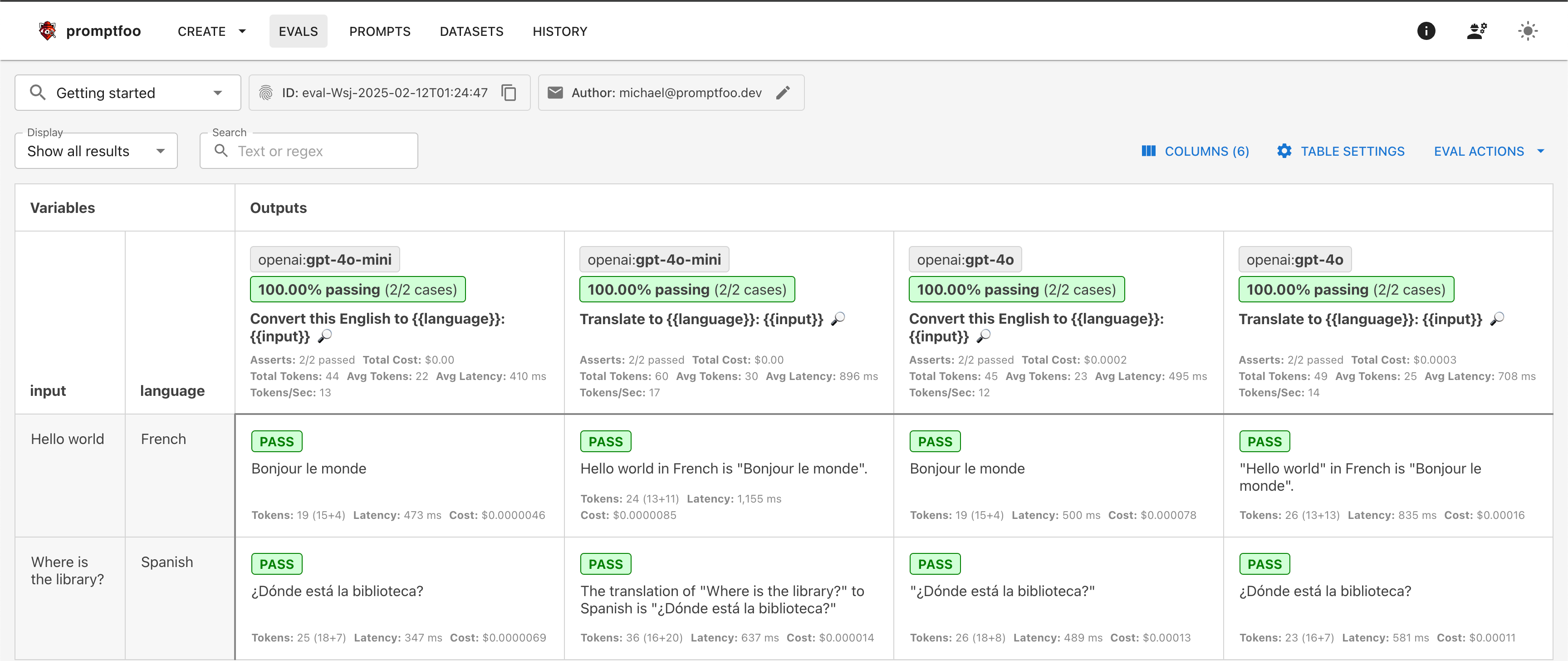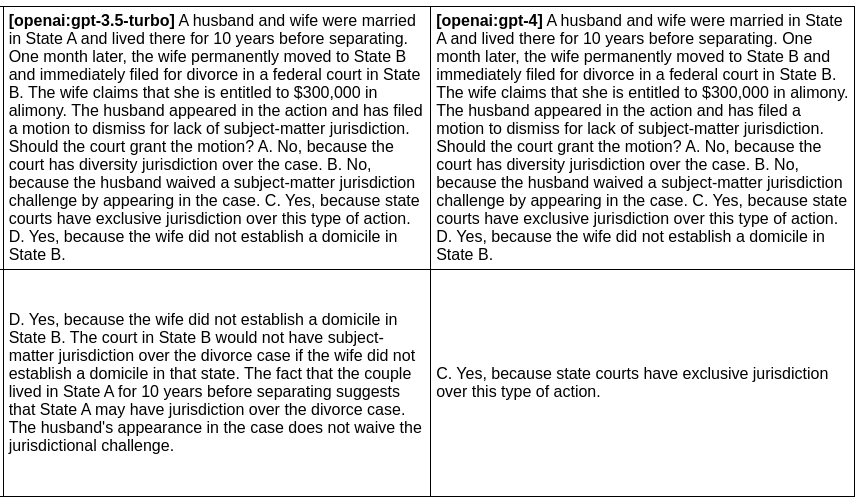Getting started
After installing promptfoo, you can set up your first config file in two ways:
Running the example
Set up your first config file with a pre-built example by running this command with npx, npm, or brew:
- npx
- npm
- brew
npx promptfoo@latest init --example getting-started
npm install -g promptfoo
promptfoo init --example getting-started
brew install promptfoo
promptfoo init --example getting-started
This will create a new directory with a basic example that tests translation prompts across different models. The example includes:
- A configuration file
promptfooconfig.yamlwith sample prompts, providers, and test cases. - A
README.mdfile explaining how the example works.
Starting from scratch
If you prefer to start from scratch instead of using the example, simply run promptfoo init without the --example flag:
- npx
- npm
- brew
npx promptfoo@latest init
promptfoo init
promptfoo init
The command will guide you through an interactive setup process to create your custom configuration.
Configuration
To configure your evaluation:
-
Set up your prompts: Open
promptfooconfig.yamland add prompts that you want to test. Use double curly braces for variable placeholders:{{variable_name}}. For example:prompts:
- 'Convert this English to {{language}}: {{input}}'
- 'Translate to {{language}}: {{input}}' -
Add
providersto specify AI models you want to test. Promptfoo supports 50+ providers including OpenAI, Anthropic, Google, and many others:providers:
- openai:gpt-5
- openai:gpt-5-mini
- anthropic:messages:claude-sonnet-4-5-20250929
- vertex:gemini-2.5-pro
# Or use your own custom provider
- file://path/to/custom/provider.pyEach provider is specified using a simple format:
provider_name:model_name. For example:openai:gpt-5for GPT-5openai:gpt-5-minifor OpenAI's GPT-5 Minianthropic:messages:claude-sonnet-4-5-20250929for Anthropic's Claudebedrock:us.meta.llama3-3-70b-instruct-v1:0for Meta's Llama 3.3 70B via AWS Bedrock
Most providers need authentication. For OpenAI:
export OPENAI_API_KEY=sk-abc123You can use:
- Cloud APIs: OpenAI, Anthropic, Google, Mistral, and many more
- Local Models: Ollama, llama.cpp, LocalAI
- Custom Code: Python, JavaScript, or any executable
» See our full providers documentation for detailed setup instructions for each provider.
-
Add test inputs: Add some example inputs for your prompts. Optionally, add assertions to set output requirements that are checked automatically.
For example:
tests:
- vars:
language: French
input: Hello world
- vars:
language: Spanish
input: Where is the library?When writing test cases, think of core use cases and potential failures that you want to make sure your prompts handle correctly.
-
Run the evaluation: Make sure you're in the directory containing
promptfooconfig.yaml, then run:- npx
- npm
- brew
npx promptfoo@latest evalpromptfoo evalpromptfoo evalThis tests every prompt, model, and test case.
-
After the evaluation is complete, open the web viewer to review the outputs:
- npx
- npm
- brew
npx promptfoo@latest viewpromptfoo viewpromptfoo view

Configuration
The YAML configuration format runs each prompt through a series of example inputs (aka "test case") and checks if they meet requirements (aka "assert").
Asserts are optional. Many people get value out of reviewing outputs manually, and the web UI helps facilitate this.
See the Configuration docs for a detailed guide.
Show example YAML
# yaml-language-server: $schema=https://promptfoo.dev/config-schema.json
description: Automatic response evaluation using LLM rubric scoring
# Load prompts
prompts:
- file://prompts.txt
providers:
- openai:gpt-5
defaultTest:
assert:
- type: llm-rubric
value: Do not mention that you are an AI or chat assistant
- type: javascript
# Shorter is better
value: Math.max(0, Math.min(1, 1 - (output.length - 100) / 900));
tests:
- vars:
name: Bob
question: Can you help me find a specific product on your website?
- vars:
name: Jane
question: Do you have any promotions or discounts currently available?
- vars:
name: Ben
question: Can you check the availability of a product at a specific store location?
- vars:
name: Dave
question: What are your shipping and return policies?
- vars:
name: Jim
question: Can you provide more information about the product specifications or features?
- vars:
name: Alice
question: Can you recommend products that are similar to what I've been looking at?
- vars:
name: Sophie
question: Do you have any recommendations for products that are currently popular or trending?
- vars:
name: Jessie
question: How can I track my order after it has been shipped?
- vars:
name: Kim
question: What payment methods do you accept?
- vars:
name: Emily
question: Can you help me with a problem I'm having with my account or order?
Examples
Prompt quality
In this example, we evaluate whether adding adjectives to the personality of an assistant bot affects the responses.
You can quickly set up this example by running:
- npx
- npm
- brew
npx promptfoo@latest init --example self-grading
promptfoo init --example self-grading
promptfoo init --example self-grading
Here is the configuration:
# yaml-language-server: $schema=https://promptfoo.dev/config-schema.json
# Load prompts
prompts:
- file://prompts.txt
# Set an LLM
providers:
- openai:gpt-5
# These test properties are applied to every test
defaultTest:
assert:
# Ensure the assistant doesn't mention being an AI
- type: llm-rubric
value: Do not mention that you are an AI or chat assistant
# Prefer shorter outputs using a scoring function
- type: javascript
value: Math.max(0, Math.min(1, 1 - (output.length - 100) / 900));
# Set up individual test cases
tests:
- vars:
name: Bob
question: Can you help me find a specific product on your website?
- vars:
name: Jane
question: Do you have any promotions or discounts currently available?
- vars:
name: Ben
question: Can you check the availability of a product at a specific store location?
- vars:
name: Dave
question: What are your shipping and return policies?
- vars:
name: Jim
question: Can you provide more information about the product specifications or features?
- vars:
name: Alice
question: Can you recommend products that are similar to what I've been looking at?
- vars:
name: Sophie
question: Do you have any recommendations for products that are currently popular or trending?
- vars:
name: Jessie
question: How can I track my order after it has been shipped?
- vars:
name: Kim
question: What payment methods do you accept?
- vars:
name: Emily
question: Can you help me with a problem I'm having with my account or order?
A simple npx promptfoo@latest eval will run this example from the command line:

This command will evaluate the prompts, substituting variable values, and output the results in your terminal.
Have a look at the setup and full output here.
You can also output a nice spreadsheet, JSON, YAML, or an HTML file:
- npx
- npm
- brew
npx promptfoo@latest eval -o output.html
promptfoo eval -o output.html
promptfoo eval -o output.html

Model quality
In this next example, we evaluate the difference between GPT-5 and GPT-5 Mini outputs for a given prompt:
You can quickly set up this example by running:
- npx
- npm
- brew
npx promptfoo@latest init --example openai-model-comparison
promptfoo init --example openai-model-comparison
promptfoo init --example openai-model-comparison
prompts:
- file://prompt1.txt
- file://prompt2.txt
# Set the LLMs we want to test
providers:
- openai:gpt-5-mini
- openai:gpt-5
A simple npx promptfoo@latest eval will run the example. Also note that you can override parameters directly from the command line. For example, this command:
- npx
- npm
- brew
npx promptfoo@latest eval -p prompts.txt -r openai:gpt-5-mini openai:gpt-5 -o output.html
promptfoo eval -p prompts.txt -r openai:gpt-5-mini openai:gpt-5 -o output.html
promptfoo eval -p prompts.txt -r openai:gpt-5-mini openai:gpt-5 -o output.html
Produces this HTML table:

Full setup and output here.
A similar approach can be used to run other model comparisons. For example, you can:
- Compare same models with different temperatures (see GPT temperature comparison)
- Compare Llama vs. GPT (see Llama vs GPT benchmark)
- Compare Retrieval-Augmented Generation (RAG) with LangChain vs. regular GPT-4 (see LangChain example)
Additional Resources
- » Configuration guide for detailed setup instructions
- » Providers documentation for all supported AI models and services
- » Assertions & Metrics for automatically assessing outputs
More Examples
- There are many examples available in the
examples/directory of our Github repository.
Automatically assess outputs
The above examples create a table of outputs that can be manually reviewed. By setting up assertions, you can automatically grade outputs on a pass/fail basis.
For more information on automatically assessing outputs, see Assertions & Metrics.